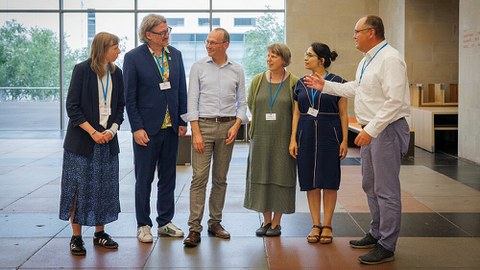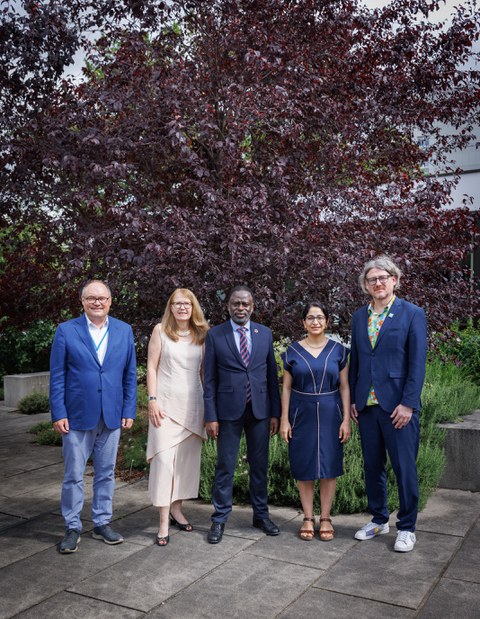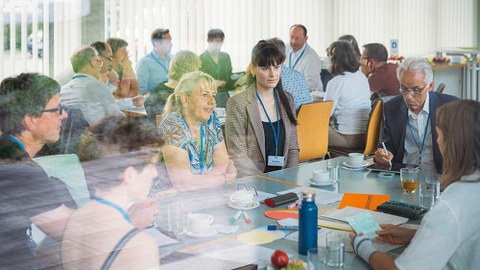Jun 28, 2023
DNCi-2023: Protecting Biodiversity | What can Saxony do?

The organizers of the DNCi-2023 (from left to right): Vera Braun (UNU-FLORES), André Lindner (TU Dresden), Saxon State Minister of the Environment Wolfram Günther, Sabine Scharfe (SMEKUL), Nora Adam (UNU-FLORES), Wolfgang Wende (IOER).
How can actors in Saxony contribute to the fulfillment of global biodiversity goals? This question was the focus of the Interim Dresden Nexus Conference (DNCi-2023) on June 23, a regional workshop format related to the international Dresden Nexus Conference (DNC). Around 50 experts from science, politics, and practice accepted the invitation from the United Nations University (UNU-FLORES), the Leibniz Institute of Ecological Urban and Regional Development (IÖR), and the Dresden University of Technology (TUD) and discussed regional solutions for the biodiversity crisis.
Halting the extinction of species and the destruction of habitats is an urgent political and social task. At the World Biodiversity Summit in Montreal (CBD-COP 15) in December 2022, almost 200 participating states agreed on a global agreement for the protection and development of nature, the Kunming-Montreal Global Biodiversity Framework. Among other things, it contains the demands to put 30 percent of the world's land and sea under protection by 2030 and also to restore 30 percent of damaged ecosystems through renaturation. But how can actors in Saxony also contribute to supporting these demands of the Kunming-Montreal obligations in the best possible way? This was the central question of the DNCi-2023, on June 23rd in the IOER.
The event also opened with words of welcome from the new Rector of the United Nations University (UNU) and Under-Secretary-General of the United Nations, Prof. Dr. Tshilidzi Marwala, who was a guest in Dresden.

Opening of DNCi-2023, from left to right: Wolfgang Wende (IÖER), Edeltraud Günther (UNU-FLORES), Tshilidzi Marwala (UNU), Nora Adam (UNU-FLORES), André Lindner (TU Dresden)
Under the heading "Reality Check at the Regional Level: Implications of the CBD-COP 15 for Saxony", around fifty experts from science, business and agriculture, political institutions, and civil society at the regional level discussed this. The aim of the event was to develop recommendations for a regional action plan with effective implementation measures. The DNCI-2023 was carried out in cooperation with the Saxon State Ministry for Energy, Climate Protection, Environment, and Agriculture (SMEKUL). In the evening, the participants were invited to a reception with Saxony's Environment Minister, Wolfram Günther, in the German Hygiene Museum.
The participants discussed various aspects relating to the protection, preservation, and restoration of biological diversity. Among other things, they discussed the time horizon for the implementation of the first measures and the urgency of taking action quickly. Questions about how the proportion of protected areas could be increased quickly and purposefully were also discussed. Those involved agreed that simply adding up the existing protected areas was not enough and that, for example, the additional establishment of a legally binding green infrastructure concept would make sense. Further discussions revolved around the reduction of pesticides and the prerequisites that are necessary in order to be able to draw up and implement a regional action plan. Financial requirements, which arise with the aim of better protecting nature, were also the subject of intensive discussions. It is also important to continue to engage in dialogue and transdisciplinary exchange on questions of biodiversity protection in the future

At the DNCi-2023 there was a lively discussion about how Saxony's nature can be better protected.
The results of the DNCi-2023 are now being summarized, prepared in writing, and published shortly.
Background
The DNCi is the regional format for the International Dresden Nexus Conference (DNC). The DNC regularly looks at the resource nexus, i.e. the integrated management of water, soil, waste, energy, and other environmental resources. While the conference series is aimed at a global audience from science and practice, the workshop format of the DNCi addresses regional actors from science, politics, and practice in order to accelerate innovation processes in selected fields of action. Both formats are jointly organized by the Leibniz Institute of Ecological Urban and Regional Development (IOER), the United Nations University Institute for Integrated Management of Material Fluxes and Resources (UNU-FLORES), and the Dresden University of Technology (TUD)
 © Thorsten Eckert
© Thorsten Eckert
Managing Director
NameMr Dr. rer. nat. André Lindner
& Advisor Internationalisation
Send encrypted email via the SecureMail portal (for TUD external users only).
School of Civil and Environmental Engineering
Visitors' Address:
Hülsse-Bau, south wing, room 384 Helmholtzstr. 10
01069 Dresden
None

